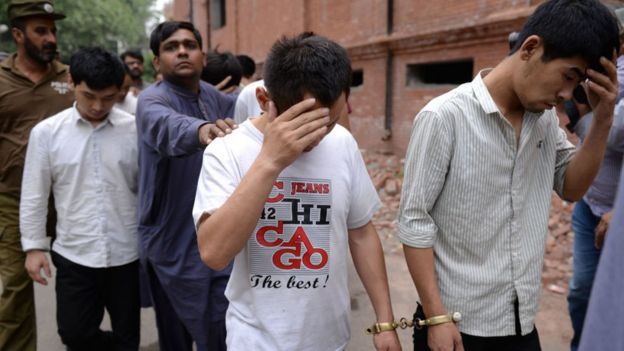Sex Dolls Are Replacing China’s Missing Women
The country's gender gap has left young men desperate for plastic alternatives.BY MEI FONG

China’s sharing economy took a new turn recently, as a new app, its symbol a single yellow banana, briefly brought rentable sex doll to Chinese phones.
Called
Ta Qu, to resemble the English word “Touch,” the app enables users to rent the life-sized dolls, which come in various models, for $45 a day — with a $1,200 deposit.
The operators assured users that they would be washed between rentals.
But Ta Qu climaxed all too soon, and it was rapidly
shut down by the authorities after the story went viral on the Chinese internet.
But they’re only the tip of a massive and growing market in Chinese society for sex dolls, as the country grapples with a growing shortage of women.
Thanks to a long-held cultural preference for sons, coupled with over three decades of restrictive population planning policies, China is forecast to have over 30 million surplus men by 2030.
This preference for boys has slowly dwindled, especially in the cities, but the country still faces a critical gap for the next few decades.
To help alleviate this and other demographic woes, Beijing in 2015 announced a switch to a nationwide two-child policy, but the damage to this generation’s sexual relationships has already been done.
Chinese authorities cannot magic up a Canadian-sized population of women to be the wives, mothers, and caregivers the country desperately needs now.This has led the nation in search of solutions, ranging from the improbable —
proposals to revive wife-sharing — to the unspeakable, such as a
rise in sex trafficking.
It has also led to a dramatic rise in the popularity of
sex toys for lonely men.
While reliable industrywide numbers are unavailable, sales of sex toys on online platforms such as Alibaba and Taobao surged an average of 50 percent year-on-year in the last five years, according to a report by
Global Times.
The lifestyle news site
StartUp Living China reported last year that Singles Day — China’s biggest online shopping event — saw a surge in the sale of sex dolls, with one seller offloading 500 units with an average of one sale per minute.
Over 65 percent of sex toys sold online were to males between the ages of 18 to 29, according to the report.
I didn’t anticipate this explosion in 2013, when I visited a sex doll factory in Dongguan, southern China.
I was researching my
book on the consequences of the
one-child policy and was curious about where a nationwide absence of women might lead.
But I was operating more on hunch than certainty that demand for sex dolls would escalate.
Even the company I profiled, Hitdoll, was hinging their business model on a mix of domestic and global sales.
Proprietor Vincent He wasn’t sure China’s burgeoning market of bachelors would be their best customer base, saying, “Thirty-year-old single men tend not to spend the money on dolls. They can go for real women.”
That said, sex toy usage — though not dolls — was already being normalized in China to a degree that was not the case in the West, in part propelled by a vast, and mostly male, migrant population separated from their families.
I knew from my reporting that the shopping areas they frequented sold products such as artificial vaginas.
There seemed to be less social stigma around the idea than in the West, judged both by the prominence with which they were displayed in the ubiquitous corner sex stores and the open discussion of the virtues and flaws of different devices in male-dominated forums online.
Aside from demographics, China has a demonstrated manufacturing capacity to bring prices down and tip sex dolls from niche to mainstream, a combustible mix.
With this in mind, in 2013 I set out to Dongguan, the pulsing heart of China’s manufacturing belt in the south.
Clad in a leather jacket and jeans, He, an affable man in his early 50s, met me at his workshop.
His company used to make office furniture for export, but rising labor costs had pushed profits down, so they began casting around for a new product.
 Manufacturer Vincent He demonstrates the features of his sex dolls in his Dongguan factory during a 2013 visit.
Manufacturer Vincent He demonstrates the features of his sex dolls in his Dongguan factory during a 2013 visit.
The workshop was small, churning out some 10-12 customizable life-sized models shipped out in coffin-like crates every month.
Scantily clad buxom models lounged in chairs; some, like the Venus de Milo, missing limbs.
He and his employees showed me around the premises with a matter-of-fact air, cupping rubbery teats and parting silicone thighs with as much sangfroid as if they were still making office chairs. “The nipples — they are very tough,” said He, tugging vigorously.
“Normal ones,” he said, “could never withstand such treatment.”
At this point all major companies making high-end dolls were overseas.
China was better known for cheaper blow-up dolls that could be easily transported.
Leading companies such as California-based Abyss Creations crafted customizable models capable of limited speech and body warmth costing about $8,000 to $10,000.
Hitdoll, in time-honored Chinese manufacturing tradition, was looking to replicate this with fewer features and a much lower price point.
For three years, Hitdoll experimented with different prototypes at a test facility in Guangzhou’s university district.
They used college students as testers, advertising with flyers that said things like, “Fake Dolls, Real Love.”
To my surprise, these testers formed a group that met regularly to eat and sing karaoke.
They even had a name, the Kawaii Club — using a Japanese term for cuteness, especially as applied to young women, adopted into Chinese.
Feng Wengguang, a former Guangdong University of Technology student, was a member.
His description of his experiences sounded like a perverse telling of Goldilocks and the Three Bears. Early on, the Kawaii Club members complained the prototypes were too stiff, too cold, too unreal. (The manager, He, remembered receiving feedback such as, “Your doll is so cold, like a dead body.”)
Hitdoll’s makers experimented with materials (silicone and TPE, or thermoplastic elastomers, found in bottle-cap liners and dental guards) breast size (C to EE) hair (synthetic, animal, human) and ethnicity (African, Asian, Caucasian).
Feng , then 24, viewed all this as playful experimentation.
He never saw himself as part of Hitdoll’s audience demographic.
He and the other Kawaii Club members were sure they could “find real woman.”
Weren’t they worried about hygiene issues?
Vincent He showed me the disposable rubber vaginas they used.
Each Kawaii member got to keep them after the trials, he said.
It was a real perk, he assured me: such things typically retailed for about $15.
All in all, the Kawaii Club soldiered through 100 prototypes before Hitdoll developed a model worthy of exhibiting at the Guangzhou Sex Culture Festival.
Most of that reporting trip didn’t find its way into my book.
For one thing, I worried that a great deal of this was speculative.
Nobody knew for sure how China’s gender gap would play out in the long run, and I didn’t want to overstate the importance of what might be a small-bore attempt to address a big problem.
 The head of a sex doll made by the HitDoll factory in Dongguan, taken in 2013.
The head of a sex doll made by the HitDoll factory in Dongguan, taken in 2013.It also sounded unbelievable, especially to Western ears.
A sex doll maker called “He,” pronounced “Her”?
And his workshop was in Guangzhou’s university district, known in Chinese as Longdong? (I still remember firmly pressing the “delete” button on my computer after spelling it out.)
In retrospect, my visit to Dongguan was significant given China’s current gender chaos.
The city, a manufacturing hub of the Chinese south, embodies skewed gender relations: it’s powered by female factory workers, yet ruled by men.
In its heyday, visiting male executives spent several months there away from their wives, with extended off-work bacchanals at the numerous karaoke bars, clubs, and brothels that earned Dongguan the nickname “Eastern Amsterdam.”
Like Silicon Valley, Dongguan owes its existence to globalization and expansiveness but is riddled with hidebound, intense sexism.
There is perhaps no more apt place for birthing the instruments that could take China’s gender wars into its next phase.
Soon after my visit, the government launched a major crackdown on prostitution in Dongguan, turning the notorious red-light city a
“deep pink.”
The crackdown, which began on Valentine’s Day, proved so ruinous it wiped out an estimated
$8 billion in takings, about one-tenth of the city’s total revenues, according to
Lin Jiang, a finance professor at Sun Yat-sen University.
Dongguan never completely recovered its anything-goes air as China’s mecca of prostitution.
But as trading of real women flagged, the market for fake women in China began to take off.
The increasing use of sex dolls has of course amplified concerns as to whether this sexually objectifies real women and encourages a Westworld-like rise in violence.
“Men’s rights activists” online have long argued that widespread use of sex dolls will deprive women of their power over men.
Some supporters of sex dolls even argue it could actually decrease rape culture and reduce demand for sex trafficking.
The U.S. State Department this year named China one of the worst offenders in the global sex trade.
It’s unclear exactly how many women are trafficked into China from neighboring countries, but numbers are definitely on the rise, spurred by the absence of young women from the marriage market, especially in rural areas.
Vietnam alone had an estimated 4,500 women trafficked between 2011-2015, with 70 percent taken to China, where a Vietnamese “bride” could fetch about $18,500.These arguments are of course echoed in other parts of the world where usage of sex robots are increasingly more popular, including even the opening of a sex doll
brothel in Spain.
But what might appear to be a whimsical desire in, say, Japan, looks expeditious in
Jiangxi, where the gender ratio is 138 men to 100 women. (The average global ratio is 105 men for 100 women.)
 Sex dolls on display at the 2016 Shanghai International Adult Toys and Reproductive Health Exhibition in Shanghai on April 14, 2016.
Sex dolls on display at the 2016 Shanghai International Adult Toys and Reproductive Health Exhibition in Shanghai on April 14, 2016.
The gains made by its educated female workforce are already sparking nostalgia for the past, including the rising popularity of lectures promoting subservient women.
In my book, I described one such workshop, where the lecturer, Ding Xuan, said strong women are more cancer-prone because, “The gods are helping you, as you do not want to be a woman any more.”
Linda Pittwood, who studies the representation of women in Chinese art, said the dolls are “an extreme representation of women as submissive objects of fantasy, available to be borrowed around by a number of men.”
She added, “These are all really damaging ideas, which I think will leak out from the sex doll-sharing service and reinforce where women are regarded in these ways in wider culture.”
The controversy is bound to intensify as sex dolls become more popular — and lifelike.
Hitdoll’s competitors, the Dalian-based
DS Doll and 2015 newcomer
J-Suntech, are already rolling out models that can be programmed for limited speech and movements through smartphone apps. (The models on Ta Qu’s stymied doll-share app can be programmed to make moaning sounds.)
It’s ironic, but arguments that sex dolls are dehumanizing will only strengthen as the models become more realistic.
Ta Qu promised a variety of fantasy women, from “Wonder Women” to “Hong Kong Student.”
But they all shared the same still, unnatural face, and fell squarely into the
uncanny valley between human and machine.
More realistic dolls, however, could blur the boundaries between real women and sex objects.
“Realistic” women are the aim of many Chinese robot-makers, even if most of them aren’t doing it for straight-up sexual purposes.
Jia Jia, developed by the University of Science and Technology of China in Hefei, was able to conduct a
stilted interview with
Wired writer
Kevin Kelly.
A former Huawei computer engineer created a robot he found so realistic he
“married” it in 2016. Fed up of being teased about his bachelor status,
Zheng Jiajia held a faux marriage ceremony with robot Yingying, vowing to eventually upgrade the robot’s abilities until it can walk and do housework.
Still, a country desperately trying to raise birth rates and keep its economy churning might have bigger problems.
As Pittwood pointed out, “That is one thing that the sex dolls can’t offer: babies.”

 Sophia (right) married a Chinese man after her pastor made introductions
Sophia (right) married a Chinese man after her pastor made introductions There are about 2.5 million Christians in Pakistan -- less than 2% of the population
There are about 2.5 million Christians in Pakistan -- less than 2% of the population
 More than two dozen Chinese nationals accused of luring girls into fake marriages have recently been arrested
More than two dozen Chinese nationals accused of luring girls into fake marriages have recently been arrested Sophia only managed to escape after her parents came to Lahore to rescue her
Sophia only managed to escape after her parents came to Lahore to rescue her Chinese companies are investing billions in Pakistan - and thousands of workers have arrived in recent years
Chinese companies are investing billions in Pakistan - and thousands of workers have arrived in recent years


